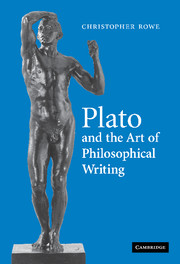Book contents
- Frontmatter
- Contents
- Preface
- Preliminaries: reading Plato
- THE DIALOGUES
- Introduction: The simile of the cave in the Republic
- 1 The Apology: Socrates' defence, Plato's manifesto
- 2 The Phaedo: Socrates' defence continued
- 3 ‘Examining myself and others’, I: knowledge and soul in Charmides, First Alcibiades, Meno, Republic, Euthyphro, Phaedrus
- 4 The moral psychology of the Gorgias
- 5 ‘Examining myself and others’, II: soul, the excellences and the ‘longer road’ in the Republic
- Appendix to Chapter 5: Socrates vs Thrasymachus in Republic I
- Interlude: A schedule of the genuine dialogues
- 6 Knowledge and the philosopher-rulers of the Republic, I: knowledge and belief in Book v
- 7 Knowledge and the philosopher-rulers of the Republic, II: the limits of knowledge
- 8 The Theaetetus, and the preferred Socratic–Platonic account of knowledge
- 9 The form of the good and the good: the Republic in conversation with other (‘pre-Republic’) dialogues
- 10 Republic and Timaeus: the status of Timaeus' account of the physical universe
- 11 Plato on the art of writing and speaking (logoi): the Phaedrus
- Epilogue: What is Platonism?
- Bibliography
- Index
5 - ‘Examining myself and others’, II: soul, the excellences and the ‘longer road’ in the Republic
Published online by Cambridge University Press: 22 September 2009
- Frontmatter
- Contents
- Preface
- Preliminaries: reading Plato
- THE DIALOGUES
- Introduction: The simile of the cave in the Republic
- 1 The Apology: Socrates' defence, Plato's manifesto
- 2 The Phaedo: Socrates' defence continued
- 3 ‘Examining myself and others’, I: knowledge and soul in Charmides, First Alcibiades, Meno, Republic, Euthyphro, Phaedrus
- 4 The moral psychology of the Gorgias
- 5 ‘Examining myself and others’, II: soul, the excellences and the ‘longer road’ in the Republic
- Appendix to Chapter 5: Socrates vs Thrasymachus in Republic I
- Interlude: A schedule of the genuine dialogues
- 6 Knowledge and the philosopher-rulers of the Republic, I: knowledge and belief in Book v
- 7 Knowledge and the philosopher-rulers of the Republic, II: the limits of knowledge
- 8 The Theaetetus, and the preferred Socratic–Platonic account of knowledge
- 9 The form of the good and the good: the Republic in conversation with other (‘pre-Republic’) dialogues
- 10 Republic and Timaeus: the status of Timaeus' account of the physical universe
- 11 Plato on the art of writing and speaking (logoi): the Phaedrus
- Epilogue: What is Platonism?
- Bibliography
- Index
Summary
In chapter 9 I shall be discussing the topic of the good in the Republic. One useful starting-point for that discussion will be the passage at Republicvi, 504a–505a, which associates the future philosopher-rulers' study of the good, the ‘greatest object of study/learning’ (to megiston mathēma: 504d2–3, etc.) with their study of the soul and of the excellences – the latter, themselves, also being among ‘the greatest things’ (504d6–e3), though the good is ranked higher. Socrates refers back to iv, 435b–d, where he put the crucial question whether the soul too contains the three eidē, kinds, that the city had been found – at any rate by the rough and ready sort of method chosen – to contain. Socrates agreed, back there in Book iv, that he and his partners in the conversation should answer the new question by using the same rough methods as before, while insisting that an accurate answer would depend on their following ‘another, longer and more considerable (makrotera kai pleiōn) road’ (435d3). Now in Book vi he suggests that such a make-do approach would be unsuitable for any ‘guard of city and laws’: he or she will need to understand things ‘in the finest possible way’. And Socrates reminds Adimantus, his interlocutor at this point, that the accounts of the four excellences agreed to in Book iv were built on that evidently less than accurate answer to the question about the soul (vi, 504a4–6).
- Type
- Chapter
- Information
- Plato and the Art of Philosophical Writing , pp. 164 - 185Publisher: Cambridge University PressPrint publication year: 2007



